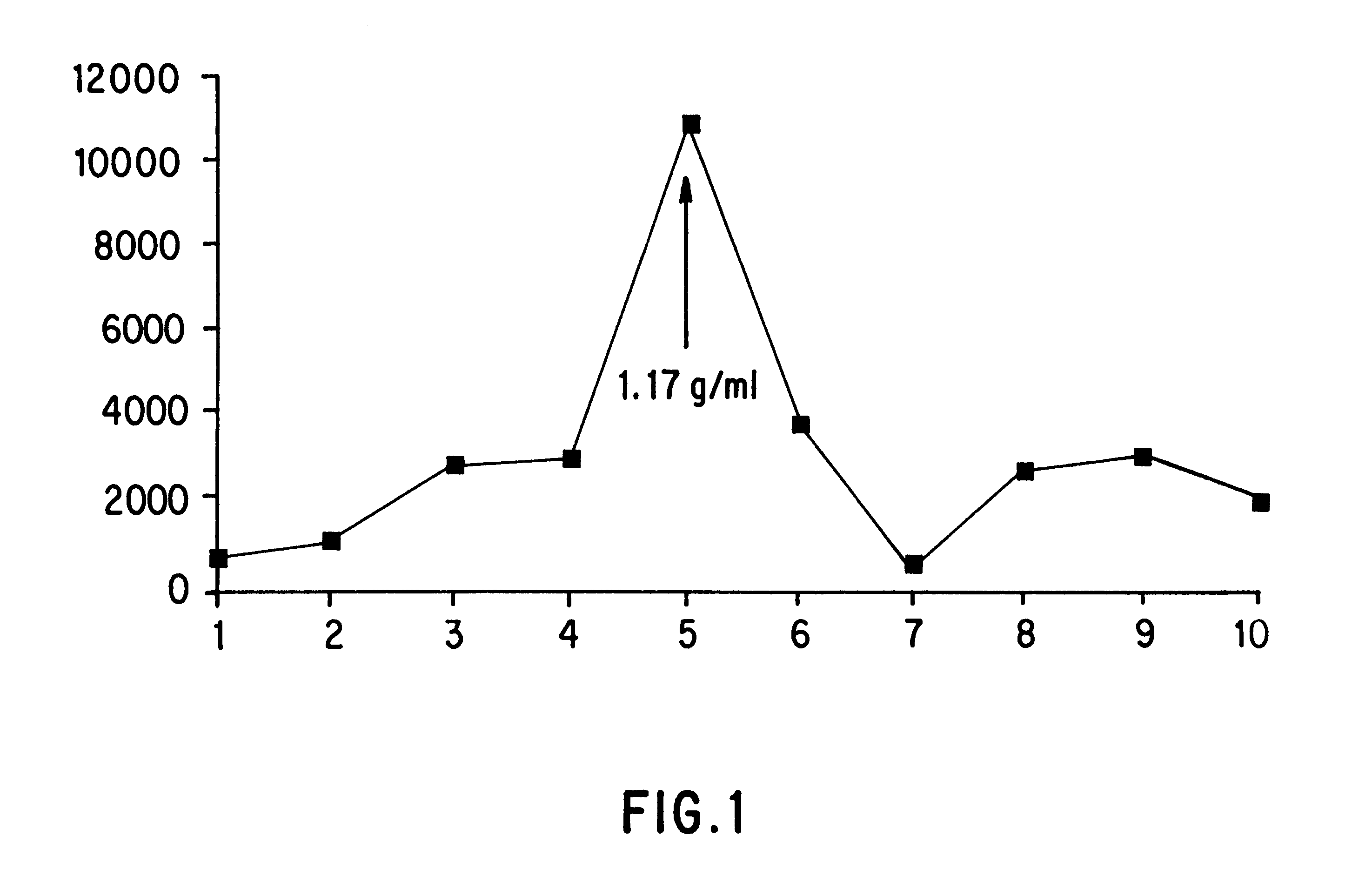Process and culture medium for the production of cells infected by a multiple sclerosis-associated virus
a technology of multiple sclerosis and culture medium, which is applied in the direction of viruses, peptides, biological material analysis, etc., can solve the problems of unable to obtain decisive results against ms, virus is difficult to study, and cell line degeneration quite rapidly
- Summary
- Abstract
- Description
- Claims
- Application Information
AI Technical Summary
Problems solved by technology
Method used
Image
Examples
example 2
In Vitro Preparation of a Culture of Primary Cells Infected by a Virus Present in a Patient Suffering From MS.
The methods for preparation of primary cell cultures starting from infected cells, for example from leptomeningeal cells, monocytes or lymphocytes, and the conditions for their growth in vitro are known to the expert (see the references above).
example 3
Preparation of a Culture of Infected Human Plexus Choroideus Cells.
Infected plexus choroideus cells are obtained after post mortem explantation of human plexus choroideus from a patient. The anatomical specimen removed under sterile conditions is delicately delacerated with tweezers and placed in a trypsin solution at about 37.degree. C. for few minutes. The tissue fragments are collected after centrifugation at a low speed (500 revolutions / minute) and the supernatant is centrifuged at 16,000 revolutions / minute for 5 to 15 minutes. The centrifugation pellet is taken up in RPMI 1640 medium (marketed by Boehringer Mannheim) comprising: penicillin (200,000 U / 1), streptomycin (200 mg / l), clindamycin (75 mg / l), L-glutamine (6 mM / l), 1% of pyruvate, serum, preferably 20 to 30% of fetal calf serum decomplemented by incubation at 56.degree. C. for 30 minutes, 1% of non-essential amino acids (Boehringer Mannheim MEM, A.A.N.E. 100X ref: 210293) and human anti-beta-interferon antibodies in the...
example 4
Analysis of the Reverse Transcriptase Activity for Monitoring the Production of Viral Particles of the LM7 Type in the Supernatant of PLI-2 Cells.
All the steps were carried out with sterile material and solutions in order to avoid any interference from bacterial nucleases or proteases, in particular during the incubation phases at 37.degree. C.
The pellets containing the viral particles concentrated in 0.01 M Tris HC1, pH 8 are thawed and homogenized. 20 pl are taken and added to a reaction mixture comprising: 5 .mu.l of (0.5 M Tris+0.04 M DTT) pH 8.2, 5 .mu.l of 0.1 M NaCl, 5 .mu.l of 0.3 M MgCl.sub.2, 23 .mu.l of doubly distilled H.sub.2 O, 10 .mu.l of 2% strength NP.sub.4 O, 2 .mu.l of polyCm-oligodG12-18 (10 ODU / ml; Pharmacia) and 5 .mu.l of 3H,3H-guanosinetriphosphate (1 mCi / ml; NEN). The glass tubes containing the mixtures are incubated at 37.degree. C. for 75 minutes. The reaction is stopped by adding 75 .mu.l of a solution, at +4.degree. C., comprising: 12.5% of H.sub.2 O sat...
PUM
| Property | Measurement | Unit |
|---|---|---|
| size | aaaaa | aaaaa |
| size | aaaaa | aaaaa |
| density | aaaaa | aaaaa |
Abstract
Description
Claims
Application Information
 Login to View More
Login to View More - R&D
- Intellectual Property
- Life Sciences
- Materials
- Tech Scout
- Unparalleled Data Quality
- Higher Quality Content
- 60% Fewer Hallucinations
Browse by: Latest US Patents, China's latest patents, Technical Efficacy Thesaurus, Application Domain, Technology Topic, Popular Technical Reports.
© 2025 PatSnap. All rights reserved.Legal|Privacy policy|Modern Slavery Act Transparency Statement|Sitemap|About US| Contact US: help@patsnap.com

